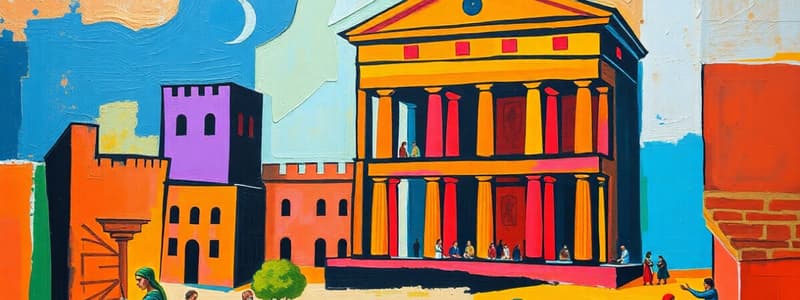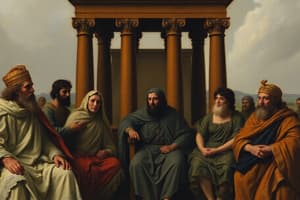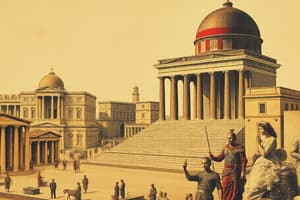Podcast
Questions and Answers
How did the Roman system of governance during the Republic differ from the Athenian model of democracy?
How did the Roman system of governance during the Republic differ from the Athenian model of democracy?
- Athenian democracy involved direct citizen participation, while Rome's system was influenced by wealthy citizens buying votes. (correct)
- Rome focused on philosophical debates to decide on laws, a practice not observed in Athens.
- Athenian democracy relied on elected officials, while Rome depended on hereditary rulers.
- Rome's democracy allowed all citizens to vote directly on laws, unlike Athens.
What societal role did some women in the Roman Empire occasionally hold, despite generally limited power?
What societal role did some women in the Roman Empire occasionally hold, despite generally limited power?
- Priestesses, officiating at certain temples. (correct)
- Dictators, appointed during times of civil unrest.
- Military generals, leading legions into battle.
- Consuls, sharing executive power in the Republic.
Considering the transition from the Roman Republic to the Empire, what was a primary risk associated with the imperial system?
Considering the transition from the Roman Republic to the Empire, what was a primary risk associated with the imperial system?
- The empire's success hinged on the competence and stability of the emperor. (correct)
- The power was equally distributed, creating inefficiencies within the empire's governance.
- The reliance on a senate led to constant gridlock and policy stagnation.
- Frequent elections led to unpredictable changes in policy and governance.
How did the Roman military conquests directly contribute to the empire's economic structure?
How did the Roman military conquests directly contribute to the empire's economic structure?
Why was Julius Caesar's appointment as dictator a turning point in Roman history?
Why was Julius Caesar's appointment as dictator a turning point in Roman history?
In the context of Roman society, what does the phrase 'bread and circuses' represent?
In the context of Roman society, what does the phrase 'bread and circuses' represent?
What was the legal status of slaves in the Roman Empire?
What was the legal status of slaves in the Roman Empire?
How did the role of women married to military generals or political leaders differ from that of ordinary women in Roman society?
How did the role of women married to military generals or political leaders differ from that of ordinary women in Roman society?
Which factor most directly contributed to the economic crisis in the late Roman Empire due to its reliance on it?
Which factor most directly contributed to the economic crisis in the late Roman Empire due to its reliance on it?
How did the structure of the Roman political system contribute to its vulnerability?
How did the structure of the Roman political system contribute to its vulnerability?
What was a significant reason for the initial widespread appeal of Christianity within the Roman Empire?
What was a significant reason for the initial widespread appeal of Christianity within the Roman Empire?
Which of the following best describes the relationship between the Roman emperors and Christianity during the first few centuries of Christianity's existence?
Which of the following best describes the relationship between the Roman emperors and Christianity during the first few centuries of Christianity's existence?
How did external military pressures contribute to the decline of the Roman Empire?
How did external military pressures contribute to the decline of the Roman Empire?
What role did the Latin language play in the cultural legacy of the Roman Empire?
What role did the Latin language play in the cultural legacy of the Roman Empire?
Assess the impact of weak or incompetent emperors on the Roman Empire's stability.
Assess the impact of weak or incompetent emperors on the Roman Empire's stability.
Which statement accurately describes the evolution of Latin after the fall of the Roman Empire?
Which statement accurately describes the evolution of Latin after the fall of the Roman Empire?
Flashcards
Refusal to Worship the Emperor
Refusal to Worship the Emperor
The practice of not worshipping the emperor as a god.
Christianity's Appeal to Slaves & Women
Christianity's Appeal to Slaves & Women
Slaves and women found acceptance and equality in the faith.
Christianity Becomes State Religion
Christianity Becomes State Religion
In the 4th century, Christianity became the state religion, and other religions were banned.
Rome's Slave-Based Economy
Rome's Slave-Based Economy
Signup and view all the flashcards
Decline of Slave Supply
Decline of Slave Supply
Signup and view all the flashcards
Political Instability in Rome
Political Instability in Rome
Signup and view all the flashcards
External Military Threats
External Military Threats
Signup and view all the flashcards
Latin Language
Latin Language
Signup and view all the flashcards
Roman Men
Roman Men
Signup and view all the flashcards
Roman Women
Roman Women
Signup and view all the flashcards
Roman Slaves
Roman Slaves
Signup and view all the flashcards
"Bread and Circuses"
"Bread and Circuses"
Signup and view all the flashcards
Roman Consuls
Roman Consuls
Signup and view all the flashcards
Roman Dictator
Roman Dictator
Signup and view all the flashcards
Roman Empire
Roman Empire
Signup and view all the flashcards
Emperor's Role
Emperor's Role
Signup and view all the flashcards
Study Notes
- Men in the Roman Empire possessed significantly more power and rights compared to women.
- All political and military leaders were men.
- Roman law designated men to hold authority and make decisions.
Women
- Women in the Roman Empire had far less power than men.
- Most women did not work, but some had important societal roles like priestesses.
- Other women worked in craft shops or bakeries.
- A small number of women started their own businesses, though this was rare.
- Women married to military generals or political leaders could gain significant influence but could not officially hold power.
Slaves
- The Roman Empire had millions of slaves, who performed almost all labor in cities and the countryside.
- Most slaves were prisoners of war captured by the Romans.
- Hundreds of thousands of people could be enslaved and sold at slave markets after each war.
- Merchants transported purchased slaves to different cities and provinces.
- Slave owners had complete control over their slaves, including the legal right to sexual abuse and physical violence.
The Republic
- Rome's democracy differed from Athens, as wealthy citizens "bought" votes by providing free food and entertainment.
- This "bread and circuses" system allowed rich families to dominate politics.
- The highest-ranking officials were called consuls, functioning similarly to modern-day presidents.
- There were always two consuls to prevent one person from gaining too much power.
- Conflicts between consuls often led to civil wars.
- Dictators were sometimes appointed to restore order.
- Julius Caesar rose to power as a successful military leader and was appointed dictator for life.
- He was assassinated due to rumors that he intended to declare himself king, triggering another civil war.
- Caesar's adopted son emerged victorious, marking the beginning of the Roman Empire.
- Power was typically inherited during the Roman Empire.
The Empire
- The Roman Empire's fate depended on the emperor's competence.
- A strong and wise emperor led to a thriving empire.
- Weak or incompetent emperors led to suffering.
- Emperors like Nero and Caligula were known for being insane.
- Weak or incompetent emperors were often assassinated.
- Some emperors ruled for a long time, expanded the empire, or successfully defended it.
Christianity in the Roman Empire
- Christianity began to spread around 50 years after the birth of Jesus.
- Christians were often persecuted for their religion and refusal to worship the emperor as a god.
- This refusal led to the imprisonment of many Christians.
- Christianity's growth was partly due to both slaves and women being able to practice the faith.
- Despite persecution, Christianity continued to spread until it became too widespread to suppress.
- Many emperors eventually converted to Christianity.
- In the 4th century, Christianity became the state religion and all other religions were banned.
Reasons for the Fall of the Roman Empire
- According to historians, a main reason for the collapse was the failure of its slave-based economy.
- Rome depended heavily on the free labor provided by slaves acquired through military conquests.
- Toward the end of the empire, the Roman army struggled to conquer new territories, creating a shortage of new slaves.
- This increased the cost of slaves and triggered an economic crisis.
- Political Instability - The Roman political system concentrated all power in the hands of a single emperor.
- An incompetent or insane emperor led to suffering for the entire empire making Rome highly vulnerable.
- The Roman Empire faced attacks from multiple directions.
- It was invaded by enemies including the Persian Empire in the east and Germanic tribes in the north.
- The Roman army struggled to defend its vast borders against these simultaneous threats.
The Cultural Legacy of the Roman Empire
- Latin remained the dominant written language for scholars, doctors, and priests until the early 19th century.
- In Western and Northern Europe, most people belonged to the Catholic Church, where the Latin alphabet was adopted for writing in local languages.
- Different variations of Latin evolved during the Middle Ages and eventually developed into the Romance languages: Italian, Romanian, French, Portuguese, and Spanish.
Studying That Suits You
Use AI to generate personalized quizzes and flashcards to suit your learning preferences.




